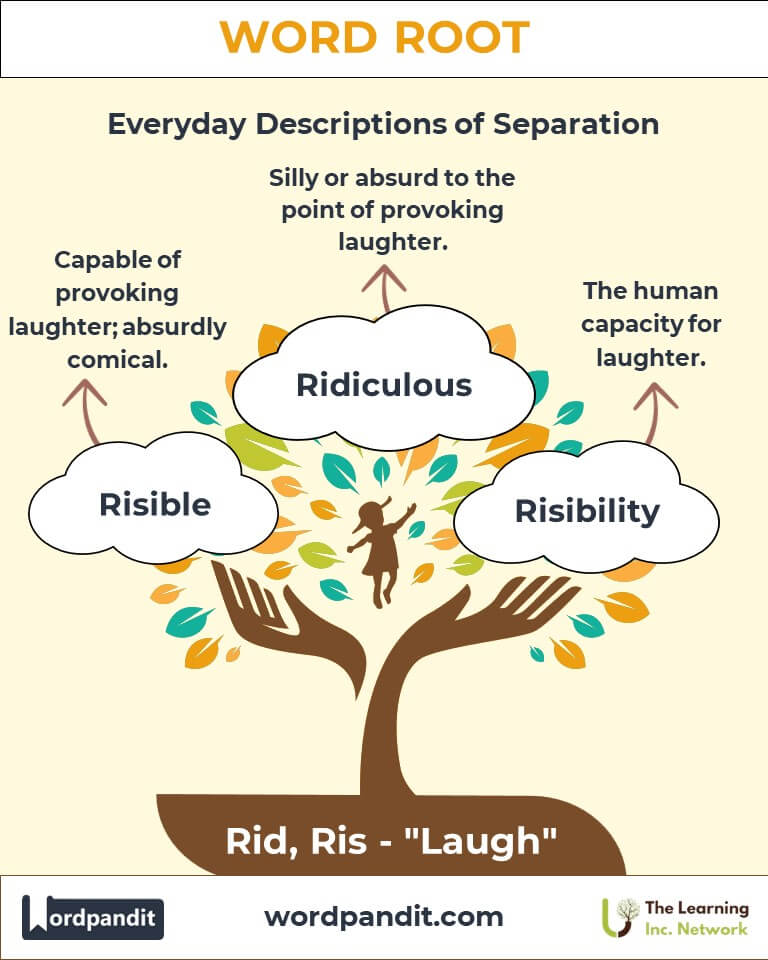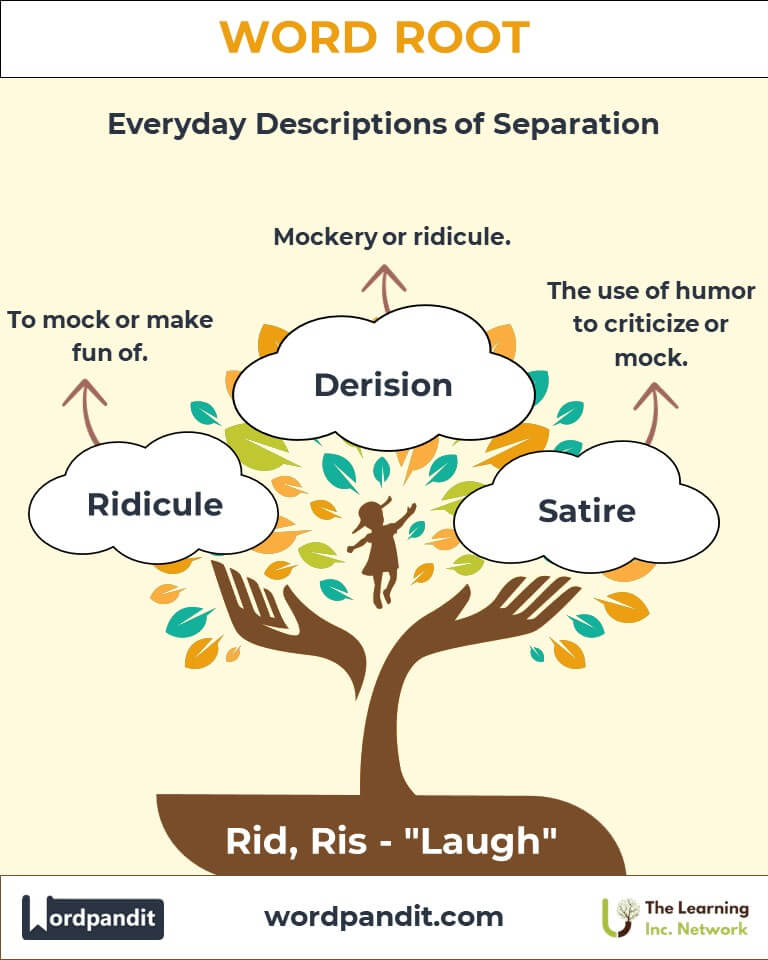Rid and Ris: The Roots of Laughter in Language and Expression
Discover the delightful essence of the word roots "rid" and "ris," both derived from Latin, meaning "laugh." From lighthearted terms like "ridiculous" to intellectual words like "risible," these roots reflect humor's role in human communication and culture.

Table of Contents
- Introduction: The Essence of Rid and Ris
- Etymology and Historical Journey
- Mnemonic: Unlocking the Power of Rid and Ris
- Common Rid and Ris-Related Terms
- Rid and Ris Through Time
- Rid and Ris in Specialized Fields
- Illustrative Story: Rid and Ris in Action
- Cultural Significance of Rid and Ris
- The Rid and Ris Family Tree
- FAQs about Rid and Ris
- Test Your Knowledge: Rid and Ris Mastery Quiz
- Conclusion: The Living Legacy of Rid and Ris
1. Introduction: The Essence of Rid and Ris
What makes laughter such a universal joy? The roots "rid" and "ris" give language a framework to express amusement, humor, and the absurd. Derived from the Latin words "ridere" (to laugh) and "risus" (laughter), these roots underline a range of words that capture the essence of what it means to laugh. Whether invoking the silliness of something ridiculous or analyzing the risible nature of comedy, these roots remind us of the enduring power of humor.

2. Etymology and Historical Journey
The roots "rid" and "ris" trace back to Latin, with ridere meaning "to laugh" and risus signifying "laughter." These terms found their way into English through Old French, where words like "rire" (to laugh) further influenced linguistic evolution. The Renaissance, with its intellectual revival, brought terms such as "risible" into prominence, signifying things capable of provoking laughter. Over time, these roots expanded their reach, enriching both everyday language and academic vocabulary.
3. Mnemonic: Unlocking the Power of Rid and Ris
Imagine a court jester holding a sign that says, "Laugh your risible worries away with ridiculous jokes!" This playful image ties the roots "rid" and "ris" to laughter and humor.
"Rid and Ris are the roots of laughter—ridiculous smiles and risible chuckles!"
4. Common Rid and Ris-Related Terms
- Ridiculous: Silly or absurd to the point of provoking laughter. Example: "Her attempt to walk in oversized clown shoes was utterly ridiculous."
- Risible: Capable of provoking laughter; absurdly comical. Example: "The risible antics of the actors had the audience in stitches."
- Derision: Mockery or ridicule. Example: "His outrageous proposal was met with derision from the committee."
- Ridicule: To mock or make fun of. Example: "She avoided public ridicule by rehearsing her speech thoroughly."
5. Rid and Ris Through Time
- Ridiculous:
- Then: Initially used to denote something worthy of ridicule or contempt in the 16th century.
- Now: Has evolved to describe anything absurdly funny or silly.
- Risible:
- Then: Once strictly an academic term describing things provoking laughter.
- Now: Widely used to describe anything humorously absurd, both in casual and formal contexts.
6. Rid and Ris in Specialized Fields
- Psychology:
- Term: Risibility – The human capacity for laughter.
- Application: Studying risibility helps understand emotional responses to humor.
- Literature:
- Term: Ridiculous – A staple in satire and comedy.
- Application: Authors use ridiculous scenarios to critique societal norms.
- Cultural Studies:
- Term: Derision – A tool in analyzing power dynamics.
- Application: Understanding how ridicule affects social hierarchies.
7. Illustrative Story: Rid and Ris in Action
In a bustling village, a man named Theo earned his living by telling the most risible tales imaginable. One day, a pompous nobleman mocked Theo’s craft as "ridiculous." Undeterred, Theo spun a story so hilarious that even the nobleman doubled over with laughter. By the end of the day, the entire village had gathered, proving that laughter truly bridges social divides.
8. Cultural Significance of Rid and Ris
From Shakespeare’s comedic plays to modern sitcoms, humor and laughter have been central to human culture. Terms derived from "rid" and "ris" encapsulate the social and psychological importance of humor. Whether as tools for satire or mechanisms for coping with stress, these roots highlight how laughter shapes collective experiences.

9. The Rid and Ris Family Tree
- Humor (Latin: humorem - moisture, later associated with mood): Describes the quality of being amusing.
- Satir (Greek: satyr - a mythical creature known for jest): A precursor to satire and parody.
- Mock: Derived from Old French moquer, relates to ridiculing or making fun.

FAQs About "Rid" and "Ris"
Q: What do "rid" and "ris" mean?
A: The roots "rid" and "ris" originate from the Latin ridere (to laugh) and risus (laughter). These roots form the basis of words that describe humor, mockery, and anything related to laughing or provoking laughter.
Q: What is "risibility"?
A: Risibility refers to the ability to laugh or be amused. Humans are often described as having the unique trait of "risibility," making us capable of understanding humor and finding things funny.
Q: Are "ridiculous" and "risible" the same?
A: While they are related, they are not identical. "Ridiculous" often conveys absurdity or something worthy of mockery, while "risible" emphasizes the potential to provoke laughter in a humorous or lighthearted way.
Q: Why is "rid" associated with mockery?
A: Over time, words derived from "rid" evolved to include a critical aspect of laughter. Ridicule, for instance, combines humor with scorn, highlighting how laughter can sometimes be used to criticize or belittle.
Q: How do these roots reflect cultural attitudes towards humor?
A: Language based on "rid" and "ris" reveals how humor has been both celebrated and weaponized across cultures. It shows the duality of laughter as a tool for joy and critique, making it a powerful and complex human expression.
Test Your Knowledge: "Rid" and "Ris" Mastery Quiz
1. What does "risible" mean?
2. What is the origin of "rid"?
3. Which word means "to mock"?
4. What is "derision"?
5. Which of the following best describes "ridiculous"?
12. Conclusion: The Living Legacy of Rid and Ris
The roots "rid" and "ris" are foundational to the language of humor and critique. They remind us that laughter, whether joyous or critical, plays a vital role in human interaction. As language evolves, these roots continue to inspire creativity and expression, celebrating the universality of laughter in connecting and uplifting us all.












